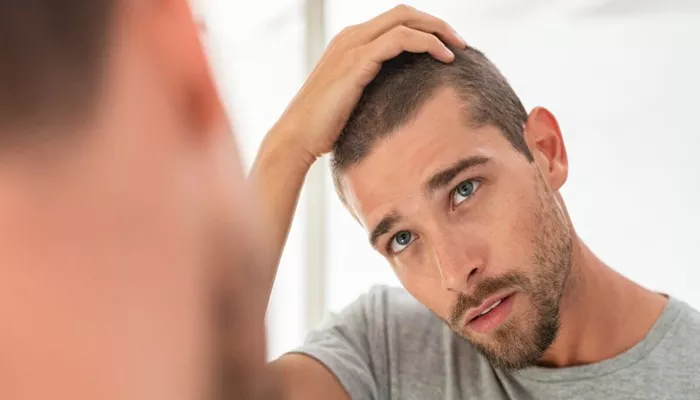Hair loss is a common and often distressing concern for men, affecting not only their physical appearance but also their self – confidence. As men age, factors such as genetics, hormonal changes, and lifestyle choices can contribute to the thinning and loss of hair. However, what many may not realize is that proper nutrition, including key vitamins and minerals, can play a significant role in combating hair loss and promoting healthier, fuller hair. Biotin (Vitamin B7), Vitamin D, Zinc, Iron, and Vitamin E, among others, are essential nutrients that have been scientifically linked to maintaining optimal hair health. Understanding how these nutrients work and incorporating them into a balanced diet or supplement routine could be the key to slowing down hair loss and even encouraging new growth for men struggling with this issue.
Biotin (Vitamin B7)
How It Helps
- Supports keratin production (hair’s structural protein)
- Strengthens hair shafts to prevent breakage
- May improve hair thickness
Recommended Dosage
- 2.5-5 mg daily
- Higher doses (10 mg) for diagnosed deficiency
Best Food Sources
- Eggs (with yolk)
- Nuts and seeds
- Sweet potatoes
- Organ meats
Clinical Evidence
A 2015 study showed 38% improved hair growth in women with thinning hair (similar mechanisms likely apply to men).
Vitamin D
Hair Benefits
- Stimulates hair follicle growth
- Reduces inflammation that contributes to hair loss
- Many balding men show vitamin D deficiency
Optimal Levels
- Blood level: 40-60 ng/mL
- Supplement dose: 2000-5000 IU daily
Best Forms
- Vitamin D3 (cholecalciferol)
- Liquid form for better absorption
Zinc
Why It’s Crucial
- Essential for hair tissue growth and repair
- Helps maintain oil glands around follicles
- Low levels linked to telogen effluvium
Recommended Intake
- 15-30 mg daily
- Higher doses short-term if deficient
Warning
Excess zinc (over 50 mg daily long-term) can cause copper deficiency and actually worsen hair loss.
Iron
Importance for Hair
- Carries oxygen to hair follicles
- Low ferritin (stored iron) linked to hair shedding
- Especially important for vegetarian/vegan men
Testing First
- Check ferritin levels (optimal >70 ng/mL for hair)
- Total iron and TIBC also useful
Supplementation
- 18 mg daily (maintenance)
- Up to 65 mg if deficient (with doctor supervision)
Vitamin E
Benefits
- Powerful antioxidant reduces oxidative stress
- Improves scalp circulation
- May increase hair count by up to 34%
Best Form
- Mixed tocopherols (not just alpha-tocopherol)
Dosage
- 100-400 IU daily
- Higher doses may increase bleeding risk
Other Key Nutrients for Hair Health
Omega-3 Fatty Acids
How They Help
- Reduce scalp inflammation
- Support hair follicle health
- Add shine and elasticity
Best Sources
- Fish oil (high in EPA/DHA)
- Flaxseeds (ALA form)
Dosage
- 1000-2000 mg combined EPA/DHA daily
Selenium
Role in Hair Growth
- Supports antioxidant enzymes
- Needed for proper thyroid function
- Deficiency linked to hair loss
Caution
- Only 55-100 mcg daily needed
- Excess causes hair loss (over 400 mcg risky)
Vitamin C
Benefits
- Boosts collagen production
- Enhances iron absorption
- Protects against oxidative damage
Recommended Intake
- 500-1000 mg daily
- Split doses for better absorption
Specialized Hair Loss Supplements
Saw Palmetto
Mechanism
- Blocks 5-alpha reductase (converts testosterone to DHT)
- Similar action to finasteride but milder
Research Findings
Several studies show reduced hair loss and improved growth.
Dosage
- 320 mg daily standardized extract
Pumpkin Seed Oil
Evidence
A 2014 study showed 40% increased hair count after 24 weeks.
How to Use
- 1000 mg daily
- Can also massage oil directly into scalp
Marine Collagen
Benefits
- Provides amino acids for hair structure
- May increase hair diameter
- Improves skin and nail health too
Dosage
- 5-10 grams daily
Lifestyle Factors That Affect Hair Loss
Diet Tips
- Eat adequate protein (hair is 90% protein)
- Consume colorful fruits/vegetables (antioxidants)
- Include healthy fats (omega-3s)
Habits to Avoid
- Tight hairstyles that pull on roots
- Excessive heat styling
- Harsh chemical treatments
Stress Management
- Chronic stress elevates cortisol (linked to hair loss)
- Practice relaxation techniques
- Ensure quality sleep
What to Expect From Supplementation
Timeline
- Reduced shedding: 4-8 weeks
- Visible regrowth: 3-6 months
- Maximum results: 9-12 months
Realistic Outcomes
- Slowed hair loss progression
- Thicker appearance of remaining hair
- Possible regrowth of miniaturized hairs
When to See a Doctor
Seek Medical Advice If:
- Sudden or patchy hair loss occurs
- Losing more than 100 hairs daily
- Scalp shows redness, scaling or pain
- No improvement after 6 months of proper supplementation
Conclusion
While no vitamin can completely reverse genetic male pattern baldness, the right nutritional support can significantly slow hair loss and improve hair quality. A combination approach works best – addressing deficiencies internally while using topical treatments like minoxidil.
Remember that hair grows slowly, so consistency is key. Most men see best results when combining supplements with a healthy lifestyle and proper hair care habits.
For men concerned about hair loss, starting with these evidence-based vitamins while consulting a dermatologist provides the best comprehensive approach to maintaining healthy hair.
Related topics:
RFK Jr. Seeks To Revise Food Additive Safety Rules: What You Need To Know
Genetically Modified Pig Liver Transplant Offers Hope For Organ Failure Patients
HHS Appoints Controversial Anti-Vaccine Activist To Investigate Vaccine Safety Data


